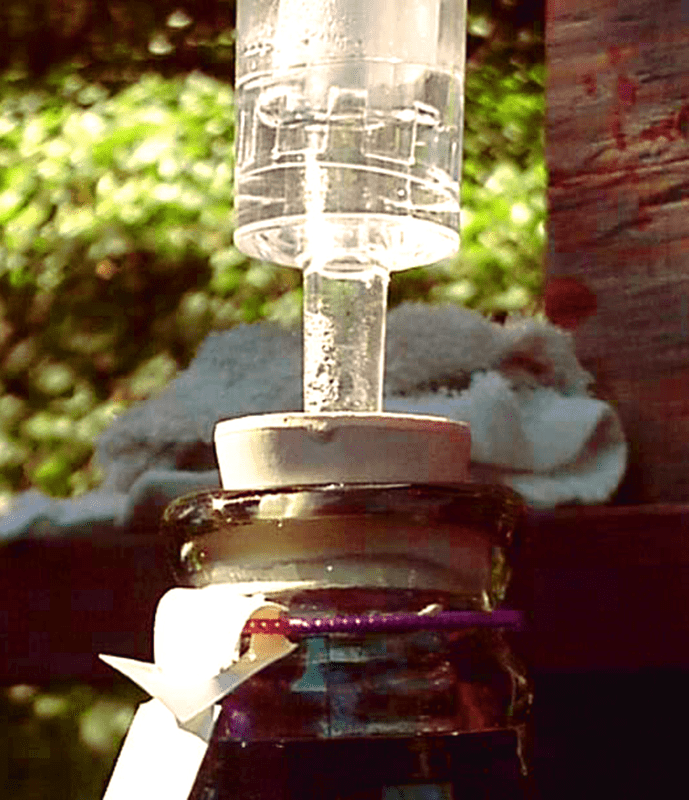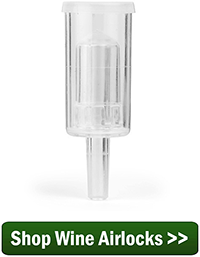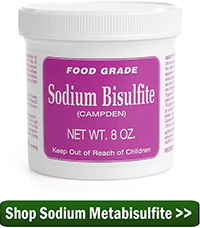 My wine is done fermenting and ready for bulk-aging for a few months in the carboy. Since the SO2 will dissipate from the sanitizing solution in the airlock after a period of time, should it be removed and replaced with fresh sanitizing solution periodically?
My wine is done fermenting and ready for bulk-aging for a few months in the carboy. Since the SO2 will dissipate from the sanitizing solution in the airlock after a period of time, should it be removed and replaced with fresh sanitizing solution periodically?
Name: Roger Collinge
State: CT
—–
Hello Roger,
This is something that is not talked about very often but is somewhat important to winemaking: how to go about using and airlock.
During the fermentation it’s really not important whether you use a sulfite solution or just plain water in the airlock. There’s so much CO2 gas coming through the airlock at that point that adding sulfites would be futile. The fermentation is perfectly capable of taking care of itself. But once the fermentation settles down it would be beneficial to have sulfites in the airlock. This would keep any bacteria, mold, germs, etc. from growing.
The problem is the sulfite dissipates so readily that you would need to add more sodium metabisulfite or replace the sulfite solution every two or three days to keep the airlock sanitary. This is not too practical.
There are two other ways of using an airlock that will help solve this problem:
- Use Vodka or grain alcohol instead of water: This will keep the lock sanitary and will not need attention every few days. The downfall to this method is that alcohol evaporates with time. So you do need to keep an eye on the airlock to make sure that it does not dry out and compromise the wine. Once a week should be sufficient.

- Use glycerin instead of water: The obvious advantage to this is that glycerin does not evaporate. You don’t have to constantly refill or replace. But the second advantage is it does not promote contaminant growth like water does. It is a very stable product, resistant to mold and bacteria.
The second method of using an airlock is the one I prefer and have used successfully for many, many years. There are no disadvantages to it, and it is much safer than using plain water. But I do know a lot of home wine makers that use alcohol in their airlocks and are perfectly happy with it.
One last thing I wanted to bring up quickly is that you do not want to put anything in the lock that you couldn’t live with being in your wine. Do not use bleaches or other toxic chemicals in your airlock.
The reason for this is because it is possible for the liquid in the lock to flow backwards and into the wine. Read the blog post, “My Air-Lock Is Working Backwards” for more information on this.
In that case of using alcohol or glycerin in the airlock, it is not an issue. Both are products that are naturally in any wine and will not be a detriment in any way. But, get a foreign sanitizer in the wine and it’s ruined. Using an airlock with such solutions is risky business and not recommended.
Happy Winemaking,
Ed Kraus
—–
Ed Kraus is a 3rd generation home brewer/winemaker and has been an owner of E. C. Kraus since 1999. He has been helping individuals make better wine and beer for over 25 years.

That was some good info, glycerin is a great idea
Does the SO2 lose it’s strength in the air lock over time? I’ve used it many times for 30 day periods and have had no problems, yet!!!
Jerry, yes it does lose it strength but not until after it has sanitized the inside of the airlock. As long as you have gas going through it from the fermentation it should be okay.
really glad I joined your newsletter. lot of good information. have thinking about trying some wine kits. have been using wine fruit in the can with good results
how long can u leave ur wine in a carboy after fermentation ?
Jimmy, you can leave a fermented wine in a carboy for as long as you like, years even, but you must get it off the sediment from the fermentation, first. This is important because the sediment can cause off-flavors to occur in your wine if you don’t.
If the wine has already fermented and you are aging it in the carboy, why put on air lock on it? Can’t you use a stopper instead?
Thanks for your reply.
Tom, if you are bulk aging your wine it is fine to use a solid stopper. I would take a look at the article below for tips on how to do so.
Bulk Storing In A Carboy
http://www.eckraus.com/blog/bulk-storing-wine-in-a-carboy
Thanks for all the info!Im having s blast making wine.Ive been making farmstead cheeses for 3yrs and this is a natural progression!Have a great day!